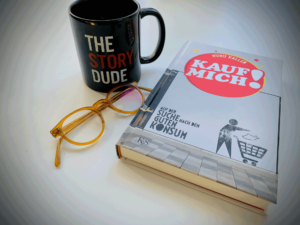Recently I came across a classic of German-language literature on my bookshelf: "Eine blaßblaue Frauenschrift". The novella from the pen of Franz Werfel is set in 1936 and is still so scorching hot today, you wouldn't believe it. The story is about Leonidas Tachezy, section head in the Austrian Ministry of Education, who rose to the highest circles by marrying the millionaire heiress Amelie Paradini. A member of the country's elite.
TOO LAZY TO READ ON? THEN LISTEN TO ME:
In the blogcast, I read this recent blog article to you. With emphasis, of course!
On his 50th birthday he receives a letter. Written in a pale blue woman's handwriting by the great love of his life, Vera Wormser. She asks the section head to make a school place possible in her former hometown of Vienna for a talented young man who, "for the reasons generally known", is no longer allowed to attend his grammar school in Germany. Leonidas apparently learns along the way, two years before the Anschluss, that he - already married at the time - has a son from an affair with the Jewish woman Vera. What will Leonidas do?
Please read for yourself what happens next. And urgently also watch the wonderful film version: (B: Kurt Rittig | Axel Corti, R: Axel Corti).
This much can be revealed here: In contrast to his namesake, the heroic King Leonidas of Sparta, the section leader Leonidas Tachezy is an amiable, mannerly, educated opportunist of a special class. Whereas King Leonidas and his soldiers had sacrificed themselves to the last man in the defence of their homeland against the Persians, the section chief gives away his inner homeland, the truth, slickly and habitually. What counts for him is his personal advantage, what others may think or say about him, his comfort, his advancement.
"Wanderer, if you come to Sparta, proclaim there that you have seen us lying here, as the law commanded," says the ancient Greek poet Simonides. Leonidas Tachezy does not lie there, but always on the right side, wherever it is. At the border to his inner home, truth is rejected, there pragmatism elegantly transforms into opportunism. Leonidas is one who lies with the truth, as the filmmakers so aptly described it. That is what the story is really about.
And so, in its timeless topicality - in the inner story of the outer plot - we discover ourselves all too eerily. Over-clearly, we look into the mirror of our own behaviour and that of countless figures from politics, business and elsewhere who flood the public conversation in the almost inescapable media channels with the lie disguised as truth in continuous operation.
This is where the storytelling trap is set, at that delicate seam where framing and narratives cast their cold shadows over the fine fabric of truth. As crucial as the right story is for all those who want to make a difference, it is precisely here that the temptation of the most useful representation, the half-truth, the deceitfulness, the backhandedness, flashes up seductively.
We have already become so accustomed to the structural confusion of argument and excuse that we largely just accept it, if we notice it at all. Isshaltso, my goodness ...
This begins with King Donald, the uncrowned ruler of the realm of alternative facts, and extends into everyday language. In all profanity: our "maybe" as a comoderate substitute for "no", the never made up as "someday". When was the last time someone said "we built a fucking loss" and not "minus growth" when "we built a fucking loss" should be said?
There we have the salad.
At some point, one stumbles over a skilfully draped trap and ends up at the feet of the barons of lies with a big belly-flop. For example, if you buy lettuce that says "Produced in Austria" on the package, highlighted with a thick red-white-red line, then you are an idiot yourself if you assume - what else should you produce with lettuce - that it was grown here and not somewhere else in the world, and that it was just picked up in Austria and put into a nice little bag. That's what "produced" means with lettuce, and that's what we have there too, and so the sentence of the good Erich Kästner comes to mind: "Whatever happens: You should never sink so low as to drink the cocoa you've been dragged through!
If one were to ask the string-pullers why they are doing this, the flood of references to consumer information and transparent labelling systems and to the clear indications on the back of the pack, which are available anyway, would be unmanageable. But! But if people were to pay less or not buy the product because of this mendacious origin, pardon: production labelling on the front, the notice would be guaranteed to disappear faster than endive wilts in the July sun, just as a lie, as we know, has already circled the globe three times before the truth puts on its shoes.
"While lying is always primarily an act, truth-telling, whether it is a matter of factual or rational truths, is precisely not," wrote Hannah Arendt in her essay "Truth and Politics", which is not limited to politics alone. Because the actively set misleading statements are everywhere for one simple reason: because the misleaders expect to earn more money than with the clear statement. It is nothing more than another shrill note in the "buy me" chorus.

On this topic and under the title "Buy me! - In Search of Good Consumption", the activist Nunu Kaller has written a book. I recommend it to you with a cheerful "Buy it!", also because it is explicitly not a book against what is so disrespectfully called consumption, but for a conscious approach to everything we buy. Nunu, by the way, is the courageous initiator behind the successful project "Shop List for Domestic Trade".
Buy me!
A covetably tempting coffee table at a flea market got Nunu Kaller thinking. She had a coffee table and was not looking for a new one. So did she really want the good piece? And then the next questions: What is happening in and to us? Why can't we just buy nothing? Can consumption also be good - for us, for the environment, for people, and if so, how? Nunu Kaller got to the bottom of it. In her book, she examines the psychology of our urge to buy, the dopamine high of bargain hunting, the tricks of the supermarkets (see above), or the greenwashing tricks of the fashion industry with special attention to the fast-fashion plague. And she makes a combative appeal to us to change from passive consumers to active creators, because: "We are more than our wallets! We have the right to raise our voices." She didn't buy the coffee table, by the way, but she recently joined me in the podcast studio for a crisp conversation.
We have the right, indeed the duty, to raise our voices. That's what we should do, above all raise our inner voice when it's necessary against ourselves. And listen to it carefully, because it tells us the truth. Always. No matter how tightly we cover our inner ears with our inner paws, it doesn't help.
In the last scene of "A Pale Blue Woman's Writing", Leonidas Tachezy sits with his wife Amelie in a state opera box at "Der Rosenkavalier" and falls asleep in the performance: "As he sleeps under the oppressive dome of this ever-excited music, Leonidas knows with inexpressible clarity that today an offer of salvation has been made to him, dark, half-loud, indefinite, like all offers of this kind. He knows that he has failed in it. He knows that a new offer will not be made again."
A saving offer.
The saving offer of our inner voice does not fall silent. But it changes the pitch, sounds shrill and poisonous at some point, perhaps like tinnitus, burn-out or weariness, if we don't listen, listen and give our inner truth, the longing for our growth, the necessary attention.
Because the inner voice shows us the way in the true direction, with the help of our values - the main words with which we write our inner story. When we know them, this emptiness disappears, which we fill with self-made stories, convenient half-truths, opportunities and other stuff that we accumulate inside ourselves in the mistaken hope that the admiring view from outside will provide light inside.
Once again, this is about the much-vaunted attitude that we, especially in difficult times like the present, have to let rain down on us in sentimental campaigns from the communication funnels of brands and companies. Hardly any of them weigh more than their own sound, the smoke fizzles out at the border where the truth is lied to, and the opportunism of the day runs rampant until the next opportunity to pander presents itself.
It would, however, be deeply desirable if companies, brands, each one of us and thus this entity called society would take on the maltreated attitude, in a positive way, in a way that benefits everyone, and if these voices were heard most forcefully. But - for a reason that puzzles me to no end - those who secretly confuse attitude with self-interest, those who basically misuse good things for their own profit, are always more adept at shaping the public conversation in breathtaking excess than those who throw themselves into the meaningful, the valuable. Even more: those who postulate "profit, profit, profit!" or storm the Capitol in Washington always have attitude, and a seductive story to boot. So we are lured again and again by the old story of conquering, defeating and dominating that we humans have always told each other: "Someone has to win, preferably the good guys, and the good guys are us because the others are the bad guys.
But if we let our inner Leonidas Tachezky sleep on comfortably in "Der Rosenkavalier", then perhaps something else would awaken in us. It does not have to be the self-sacrificing King Leonidas who, with his own, "... covers the bottleneck of freedom with his body ..." (Thomas Mann). (Thomas Mann). At least there would be a chance that, despite many things that speak against it, a new story would begin and be heard, a better story than the old one was for us. A new story that is about all of us and multiplies our strengths instead of dividing us as soon as it is convenient, like the old story.
I think that 's what my grandmother, old Story Dudette, meant when she wrote in her dark blue woman's handwriting to Section Chief Leonidas Tachezy: "No Story. No Glory."




